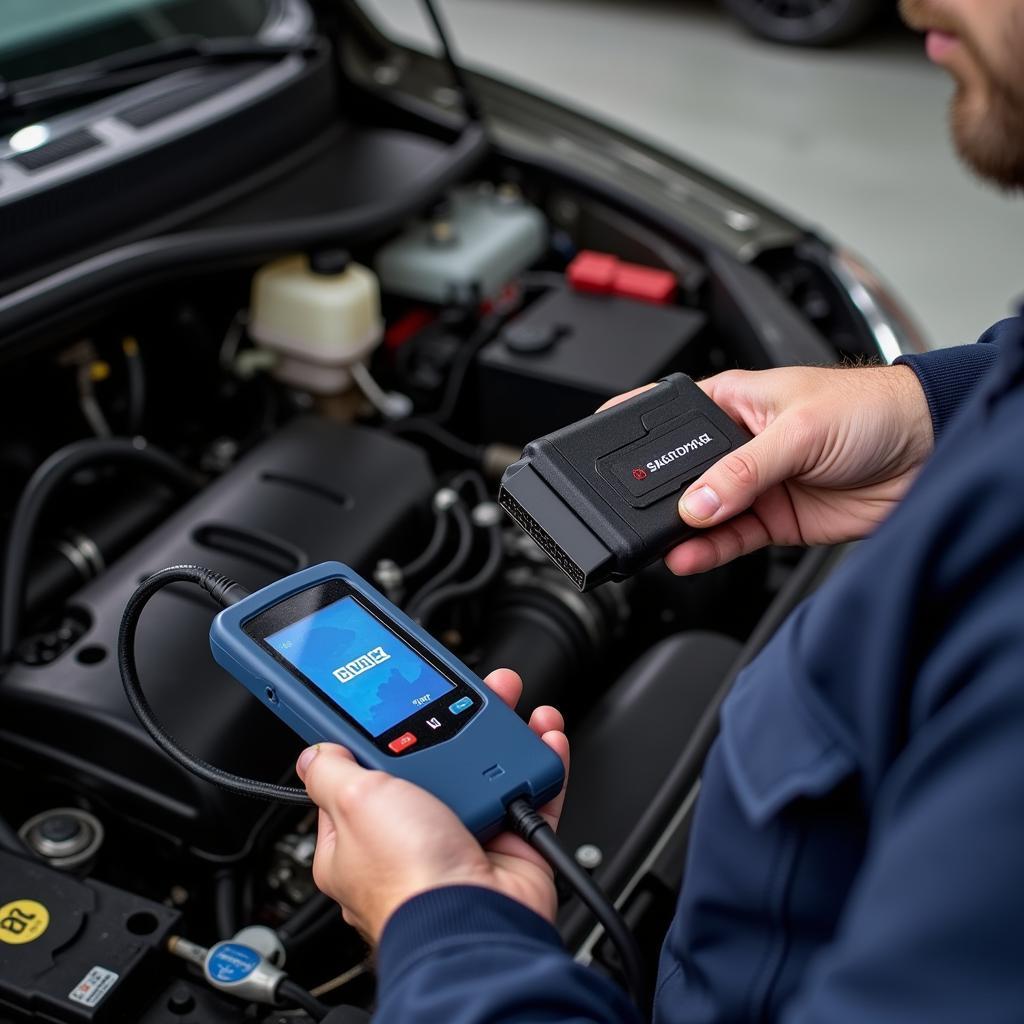Knowing the Cost Of A Diagnostic Test On A Car can be confusing. Prices vary widely, and you might be wondering if you’re getting a fair deal. This article breaks down the factors influencing diagnostic test costs and provides insights to help you make informed decisions about your car repairs.
Understanding Car Diagnostic Tests
Before delving into the costs, let’s clarify what a car diagnostic test entails. It’s essentially a specialized procedure using a scanning tool to communicate with your car’s computer system. This system, also known as the Engine Control Unit (ECU), monitors various sensors and components in your vehicle.
Think of the diagnostic test as a health checkup for your car. It identifies potential issues by reading stored error codes in the ECU. These codes act as clues, pointing mechanics toward the root of the problem.
Factors Affecting Diagnostic Test Costs
The cost of a diagnostic test on a car can vary significantly based on several factors:
-
Location: Geographic location plays a role, with larger cities generally having higher labor costs compared to smaller towns.
-
Type of Mechanic: Choosing a dealership, independent mechanic, or specialized repair shop will impact the price. Dealerships often charge more due to brand-specific expertise and overhead costs.
-
Car Make and Model: Different car makes and models have varying levels of computer system complexity. Diagnosing issues in luxury or high-performance vehicles might be more expensive than working on standard models.
-
Diagnostic Equipment: The sophistication of the diagnostic equipment used also influences the cost. Advanced scanners capable of in-depth analysis and specialized tests typically come at a premium.
-
Underlying Problem: Sometimes, the cost of the diagnostic test is bundled with the repair cost. If the issue is simple to fix, the overall price might seem lower than a complex problem requiring extensive diagnostics.
 Mechanic Performing a Car Diagnostic Test
Mechanic Performing a Car Diagnostic Test
Average Diagnostic Test Costs
While providing an exact price for a diagnostic test is impossible without specifics, here’s a general range to give you an idea:
- Basic Diagnostic Test: $50 – $100
- Comprehensive Diagnostic Test: $100 – $400
Remember that these are just averages. Always inquire about the cost upfront and request a breakdown of the charges.
Common Diagnostic Test Costs: Examples
Let’s illustrate with common scenarios:
-
Check Engine Light: Diagnosing a check engine light is a frequent reason car owners seek a diagnostic test. The cost can range from $80 to $150 on average.
-
Transmission Problems: Diagnosing transmission issues often requires specialized equipment and expertise, potentially costing between $100 and $200.
-
ABS Light: Diagnosing problems related to the Anti-lock Braking System (ABS) can cost around $100 to $150.
 Mechanic Discussing Diagnostic Results with Car Owner
Mechanic Discussing Diagnostic Results with Car Owner
Is a Car Diagnostic Test Worth It?
You might wonder if paying for a diagnostic test is truly necessary. The answer is a resounding yes. Consider these benefits:
-
Accurate Diagnosis: A diagnostic test eliminates guesswork, providing mechanics with precise information to pinpoint the problem.
-
Cost Savings: By identifying the root cause, you avoid unnecessary repairs that could cost you more in the long run.
-
Preventative Maintenance: Regular diagnostic tests can reveal minor issues before they escalate into major problems, saving you time and money on costly repairs down the line.
-
Increased Safety: Addressing issues promptly ensures your vehicle remains safe and reliable on the road.
Tips to Save Money on Diagnostic Tests
While you shouldn’t skip a necessary diagnostic test, you can explore ways to potentially reduce costs:
-
Ask for Recommendations: Seek recommendations from friends, family, or online communities for reputable mechanics known for fair pricing.
-
Compare Quotes: Don’t hesitate to call around and compare quotes from different mechanics and repair shops.
-
Check for Coupons or Discounts: Look for coupons or discounts offered by mechanics or auto parts stores.
-
DIY Options: If you’re technically inclined, consider purchasing an OBD-II scanner and learning to interpret basic error codes. However, keep in mind that complex issues often require professional expertise.
Conclusion
Understanding the cost of a diagnostic test on a car is crucial for responsible car ownership. By being aware of the factors influencing prices and asking the right questions, you can approach car repairs with confidence. Remember that investing in a diagnostic test is an investment in your car’s health, potentially saving you money and headaches in the future.
FAQs
Q: How often should I get a car diagnostic test?
A: It’s generally recommended to get a diagnostic test annually or whenever your check engine light illuminates.
Q: Can I drive my car with the check engine light on?
A: While driving short distances with the check engine light on might be possible, it’s crucial to get it checked as soon as possible to avoid potential damage or safety hazards.
Q: Will a diagnostic test tell me exactly what’s wrong with my car?
A: A diagnostic test provides valuable clues and error codes that guide mechanics toward the problem’s root cause. However, further inspection might be needed to confirm the diagnosis.
Q: Are there any free car diagnostic test options available?
A: Some auto parts stores offer free code reading services, but keep in mind that these might not be as comprehensive as a professional diagnostic test.
Q: What is the difference between a diagnostic test and a car inspection?
A: A diagnostic test focuses on the electronic systems of your car, while a car inspection is a visual examination of various components for safety and roadworthiness.
Common Situations When You Might Need a Diagnostic Test:
- Illuminated Warning Lights: Check engine light, ABS light, airbag light, etc.
- Unusual Noises: Clicking, grinding, knocking, or any other unfamiliar sounds.
- Performance Issues: Engine misfires, rough idling, hesitation, or decreased fuel efficiency.
- Starting Problems: Difficulty starting the engine or intermittent starting failures.
- Electronic Malfunctions: Issues with power windows, locks, lights, or other electrical components.
For more information on car diagnostics and related topics, explore our other articles:
Need assistance with your car’s diagnostics? Contact us via WhatsApp: +1(641)206-8880 or Email: [email protected]. Our dedicated support team is available 24/7 to assist you.

Leave a Reply